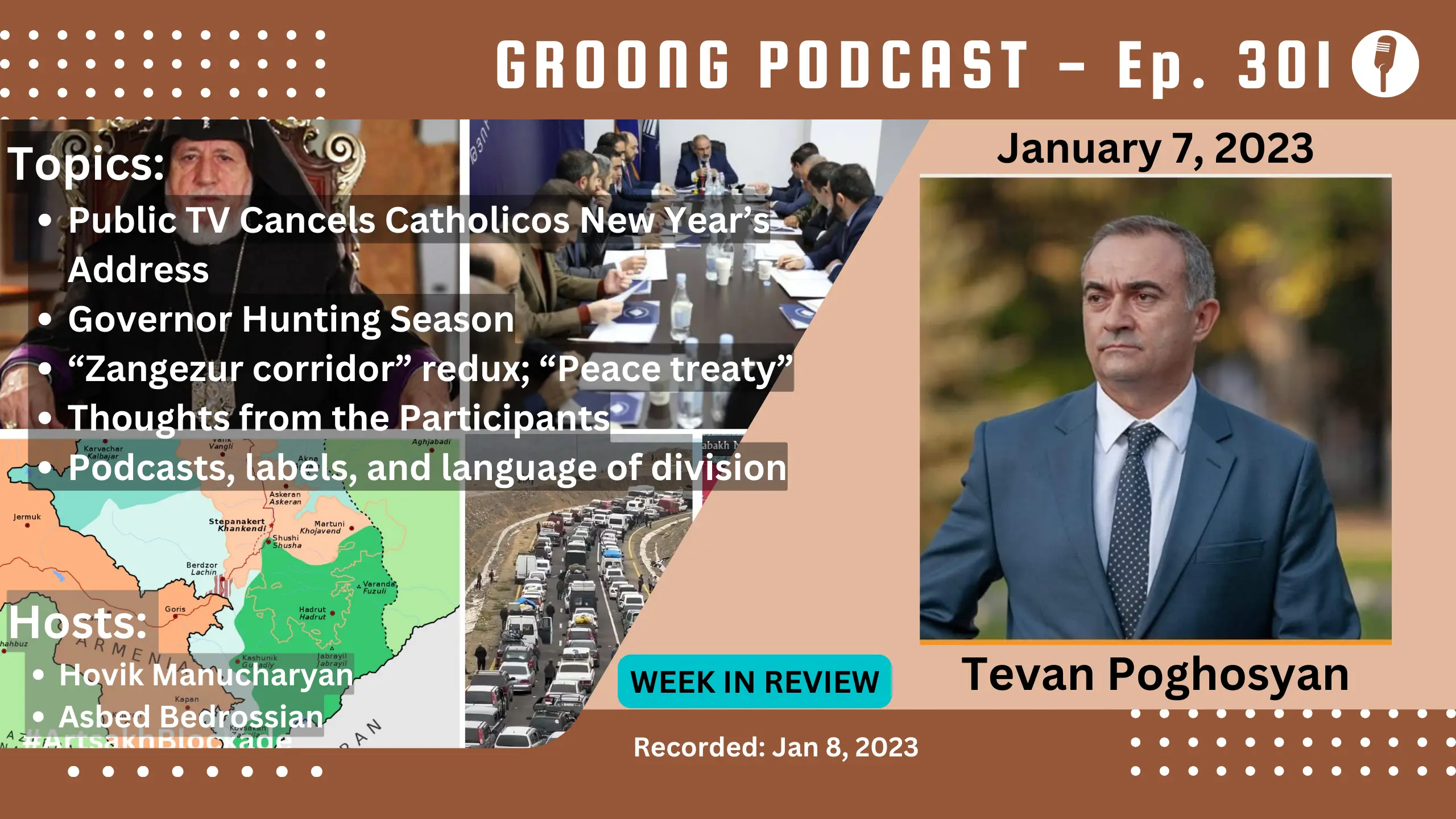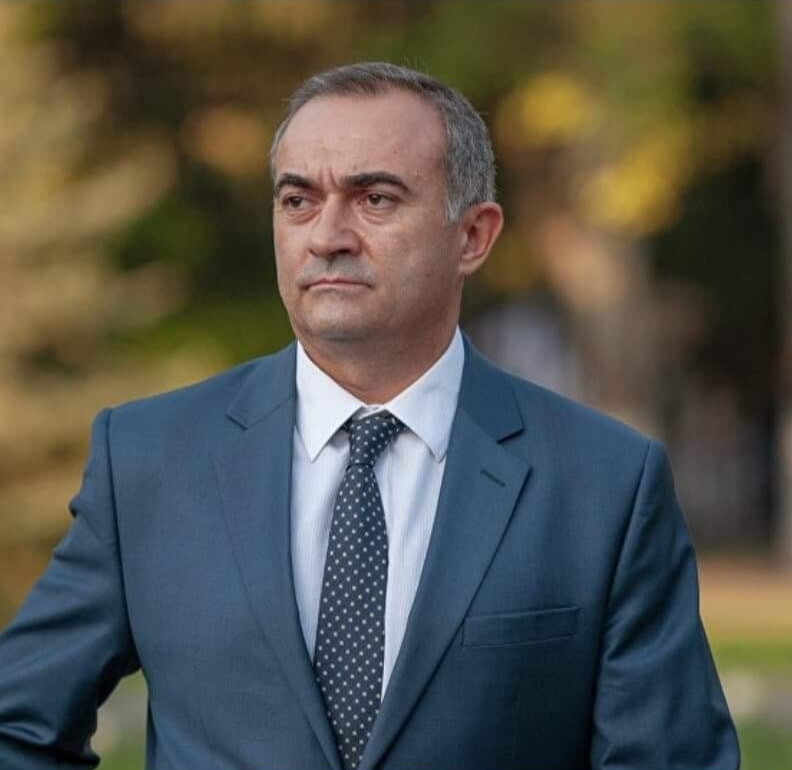
Groong Links:
Guest:
Topics:
- Public TV Cancels Catholicos New Year’s Address
- Governor Hunting Season
- “Zangezur corridor” redux; “Peace treaty”
- Thoughts from the Participants
- Podcasts, labels, and language of division
Episode 301 | Recorded: January 8, 2023
Show Notes
State TV Cancels Catholicos New Year’s Address
For the past few decades the tradition has been that the Catholicos of All Armenians addresses the nation on New Year’s eve, followed by addresses by the top leader of the nation: either the president or the prime minister.
Reportedly, at the last minute Public TV tried to switch the time of the catholicos’ address to an earlier slot, to be shown during the evening news, but Etchmiadzin refused it. As a result, the address of the catholicos was not aired on December 31st, 2023.
Many observers and analysts believe that this negative attitude by Public TV, which is run by Nikol Pashinyan cronies, is due to Pashinyan’s contentious and confrontational relationship and posture towards the Armenian church.
Along with many Armenian and diasporan institutions since the disastrous 44-day war, the church has also joined calls asking for Pashinyan to resign and give way to the formation of a new government of unity.
BACKGROUND: (just to name a few of the points of friction…)
- During the 2018 coup, there was a similar effort by the revolutionaries to do a coup in the church, the movement was called: Նոր հայաստան, նոր հայրապետ. During those days, the Catholicos was even physically assaulted by this group. One of the organizers of this group, Karen Petrosyan, during the peak days of the movement in July 2018, was appointed as the director of the State Engineering University of Armenia, Gyumri branch.
- In 2019, claiming that some clergy are conspiring against him, warned that those clergy “will be brought down to their knees both literally and figuratively”.
- In 2021, Pashinyan said “If the church’s relationship with the government is not good, then the church’s relationship with God is not good”
- Pashinyan’s education ministers have pushed the topic of the History of Armenian Church out of the primary education curriculum, first promising that it would be covered in combination with Armenian history, but the church complains that even that promise has been broken.
Questions:
- Pashinyan’s relationship with the Armenian church has been shaky since 2018. What brought on this escalation at the turn of this year?
- What can the church do, in the face of an aggressive and adversarial government?
- Where do you see this relationship heading in 2024?
Governor Hunting Season
In the past few weeks, various Armenian regional officials, for example Marz governors have been apparently fired and replaced: Aram Khachatryan, governor of Lori; Eduard Hovannisyan, governor of Armavir; Ararat Grigoryan, governor of Vayots Dzor and the reinstatement of ruling party loyalist deputy governors; as well as various cabinet ministers shuffling between appointments. The sackings happen after Pashinyan’s public visits to those regions, where he inspects upgraded infrastructure; for example, at remodeled schools on camera he found some deficiencies in the work, such as a coat hook in a locker room, which fell off after Pashinyan visibly applied force to it; in another instance, Pashinyan argued that the basketball gym was not built to official standards of basketball. Pashinyan is apparently a basketball expert too!
Analysts believe we may be seeing early indications that Civil Contract is planning early elections in Armenia. There have been more frequent Civil Contract leadership meetings chaired by Pashinyan himself. Also, on this show we have discussed that Ilham Aliyev has pushed for early presidential elections in Azerbaijan. His so-called “re-election” will happen next month, February 2024, instead of October of 2025.
Questions:
- Are we seeing a ruling party push for early national elections in Armenia? Why?
- Are these elections related with Aliyev’s early elections in Azerbaijan?
- How are these related to the Armenia-Azerbaijani negotiations?
“Zangezur corridor” & “Peace treaty” Redux
After the 44-day war and for two years we heard both Turkey and Azerbaijan loudly argue for a so-called “Zangezur corridor”, their spin on point 9 of the Nov 10, 2020 statement, which specifies that Russian border guards should secure the “economic and transport links in the region”, specifically through Armenia that connect Azerbaijan proper with Nakhijevan. Pashinyan has argued that Erdogan and Aliyev want an “extra-territorial” corridor, but then again, he signed under a declaration which apparently gives responsibility for “control” over transit routes to a third country.
Sometime after spring of 2023, Baku and Ankara changed their tune, saying that the “Zangezur corridor” is no longer interesting to them since they have a “Plan B” which goes through Iran. They proceeded to sign paperwork with Iran and ceremoniously started construction of a rail link through Northern Iran.
Then, in October of 2023, during testimony in congress the State Department’s James O’Brien said that a transit corridor through Armenia by force or with involvement of Iran will evoke a strong reaction. This was at the same testimony where he said that the US is ceasing official high-level visits with Azerbaijan and said “no business as usual” duo to the ethnic cleansing in Artsakh, only to fly to Baku himself two weeks later.
Now, as 2024 rolled in, Baku officials are again demanding a “corridor” through Armenia and using the term “Zangezur corridor”. Aliyev himself towards the end of 2022 had said that Azerbaijani citizens should not be inspected by Armenian customs or security officials.
Over the weekend Turkey again, through its Defense Minister Guler, said that it is imperative to sign a so-called “peace treaty” with Azerbaijan. We all know that Turkey has been holding the establishment of relations between Turkey and Armenia hostage to the Armenian-Azerbaijani treaty. During the same press-conference, Guler said that Turkey’s military cooperation with Azerbaijan will only increase.
Questions:
- Can we assume that when Azerbaijan uses the term “corridor”, they’re really talking about an extra-territorial link through Armenia? Why is Azerbaijan talking corridors through Armenia again?
- Is this round of “Zangezur corridors” motivated by long-running Turkish dreams as you say, or a consequence of US backlash against Iranian involvement in regional unblocking and detente?
Opposition Gets Access to Treaty Document
Three Armenian opposition members were allowed to see drafts of the so-called “peace treaty” that is in the process of negotiation. Confidentiality is an important condition for such access, so the opposition members aren’t able to specify any details, however, they did issue a dire warning, saying that getting familiarized with the document “only proved its danger and confirmed all fears.”
According to Hayastan Alliance MP Ishkhan Saghatelyan the treaty in question has nothing to do with peace, and will consolidate Azeri gains. In fact he says that Azerbaijan will not leave Armenian territory; there is nothing about Armenia’s 29,800 km.sq.; Artsakh and Armenian prisoners will remain in jail in Baku; border demarcation and delimitation is left to an undetermined future process.
We also know that Aliyev has alluded to guarantees that Armenia will never again be a military threat to Azerbaijan.
Questions:
- Is this a capitulation document? Are fears expressed by the opposition, and a large segment of both republic and diasporan Armenians, justified that this is a disastrous treaty to sign?
- Why is Pashinyan so adamant to sign it if it is so frightening?
Topics from the Panelists
Hovik: If you haven’t discovered them yet, check out the following two Artsakhtsi-run podcasts:
- փոդքաթ / podcut: Hosted by two journalists from Artsakh, in Artsakh dialect. This podcast was started recently, after the ethnic cleansing in Artsakh.
- Inadu / Ինադու: Hosted by two young ladies (Nina and Shogher) from Artsakh, in literary Armenian dialect. The podcast was started in Artsakh during the blockade and documents the ordeals of the blockade, then the abrupt war, and displacement.
A controversy arose when on the Inadu podcast, the hosts in episode 11 were trying to relay how to talk to Artsakhtsis to minimize their trauma. Unfortunately, they made some statements that reverberated negatively. Specifically, they said not to use the term “Karabakh clan” and went on to say that most Artsakhtsis had nothing to do with the “Karabakh clan” and were also victims. This immediately transformed the discussion into a political one and specifically using the ugly terminology “K clan” which was devised to foster anti-Artsakhtsi hate.
Narek Samsonyan and Vazgen Saghatelyan from the “Imnemnimi” podcast reacted to this, but in my opinion the “accent” (excuse my pun) was put on the wrong thing, bringing up purported evidence that one of the hosts is related to a government member from the days of Serzh Sargsyan and Robert Kocharyan and thus were also part of the “clan”.
In reality, the answer is simple. Those who coined the term “Karabakh clan” meant to spread hate against Artsakhtsis and therefore any use of the term should be rejected. The hosts of Inadu should not have used that term.
Wrap-up
That’s our Week in Review, we hope you found it helpful. We invite your feedback and your suggestions, you can find us on most social media and podcast platforms. Thanks to Laura Osborn for the music on our podcasts.
Guests

Tevan Poghosyan
Tevan Poghosyan is president of the International Center for Human Development. Mr. Poghosyan was an MP in the National Assembly between 2012 and 2017 from the Heritage party. From 1997 to 1999 he served as the Nagorno-Karabakh Public Affairs Office Director in Washington, D.C.
Hosts

Hovik Manucharyan
Hovik Manucharyan is an information security engineer who moved from Seattle to Armenia in 2022. He co-founded the ANN/Groong podcast in 2020 and has been a contributor to Groong News since the late 1990s.
Disclaimer: The views expressed by Hovik Manucharyan on the ANN/Groong podcast are his own and do not necessarily reflect the opinions of his employer or any other organization.

Asbed Bedrossian
Asbed Bedrossian is an IT professional, and for years oversaw the central IT enterprise infrastructure and services at USC. His decades of experience spanned across IT strategy, enterprise architecture, infrastructure, cybersecurity, enterprise applications, data center operations, high performance computing, ITSM, ITPM, and more.
Asbed founded the Armenian News Network Groong circa 1989/1990, and co-founded the ANN/Groong podcast in 2020.